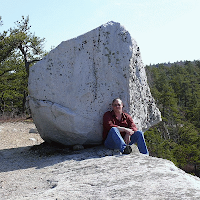Repcheck writes in the Prologue, when discussing the development of the natural sciences:
Scholars who investigated fields that did not touch on church doctrine were relatively unaffected, but those who explored the natural world were playing with fire - the figurative fire of controversy, the real fire of the heretic's pyre, and the eternal fire of damnation if the church felt they had stepped too far. It required genuine bravery even to venture into these issues; it required hard-to-imagine resolve to promote a position that conflicted with church teachings.
Why did science move away from the traditional Biblical view of an Earth divinely created in 4004 BC and the belief in a global flood around 2350 BC (according to Archbishop Ussher's famous chronology published in 1650) and risk the wrath of the church? Because people like Scottish naturalist James Hutton started simply looking at rocks and thinking about what they saw. It's hard to imagine how difficult that was - intellectually, professionally, socially - when the results of such investigations were seen by many as heresy.
When Hutton wrote in 1788 that "The result, therefore, of our present enquiry is, that we find no vestige of a beginning,–no prospect of an end" it was a direct challenge to the church teaching of a relatively recent divine creation. What's amazing to me is that there are still religiously-motivated people over 200 years later, at a time when there's irrefutable evidence of a multi-billion-year-old Earth, who still insist on denying reality.



No comments:
Post a Comment